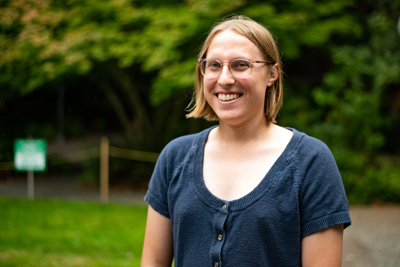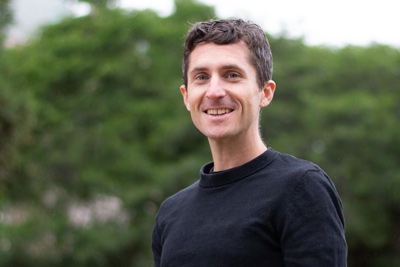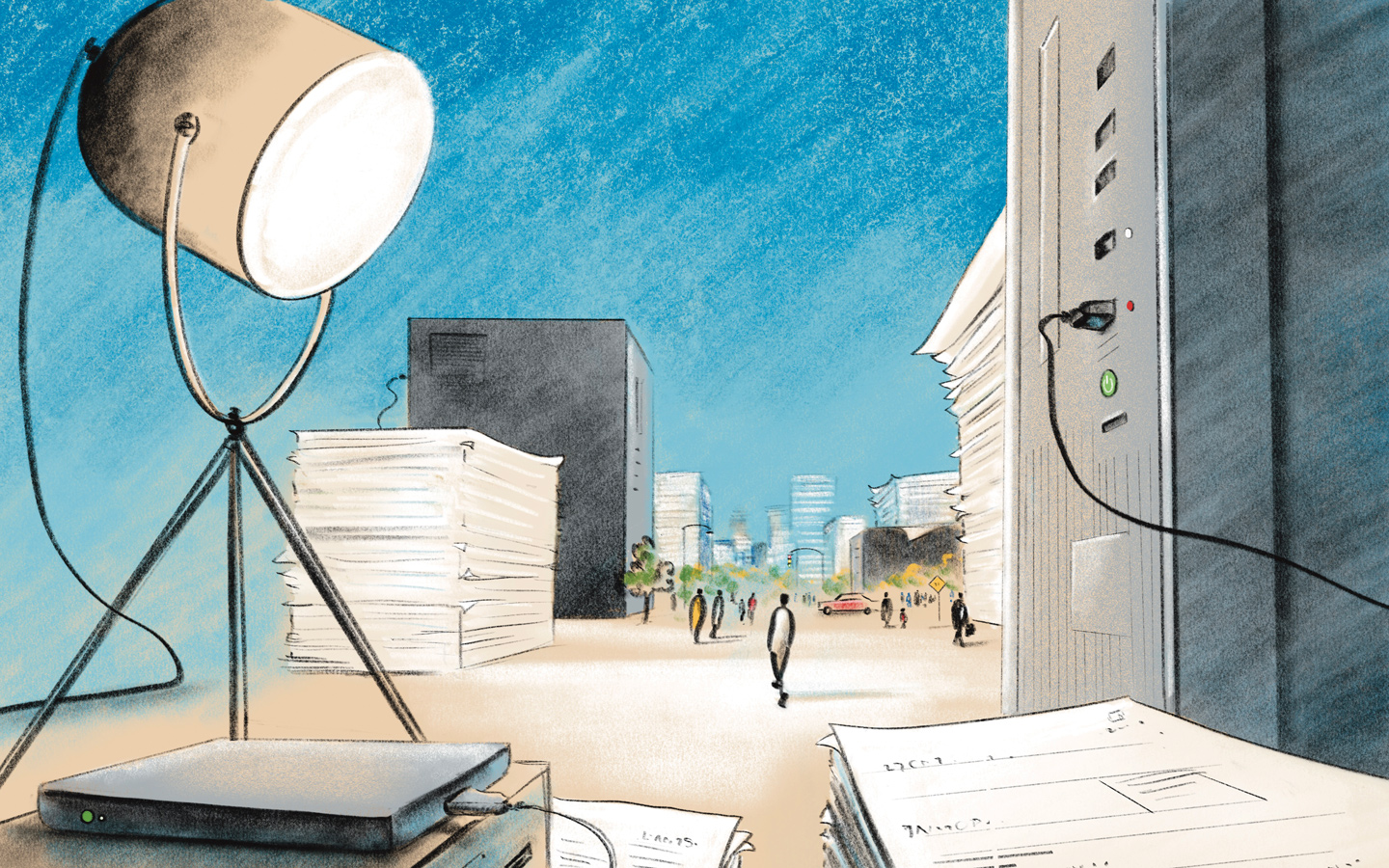The idea grew out of a disagreement. Eva Maxfield Brown was an undergraduate student six years ago at the Information School. She was paying close attention to a controversial issue before the Seattle City Council to allow a new NBA arena to be built in the SoDo District. So was one of her professors, Nic Weber.
When the vote occurred, they read about it the following day. They disagreed on why a council member voted a certain way and even whether that member’s vote was decisive. So they sought out the council meeting recording.
“It took us a surprising amount of time to find the recording of that meeting,” said Weber, who is an assistant professor at the iSchool. “Once we found the recording, it was a matter of searching through it. We both had somewhat different takes (on what the council member said). What we shared in common was a sense that this can and should be easier.”
Together, they knew that the machine learning and artificial intelligence tools taught at the iSchool could help.
“We decided, ‘Let’s make city council meetings easier to follow,’” Brown said.

So they developed the Council Data Project, a website that creates searchable transcripts of city council and committee meetings as well as establishing a way to track legislation and voting records of elected officials. Now in its third iteration, the Council Data Project compiles transcripts from 17 cities across the U.S. with more soon to come.
At first, Weber and Brown expected that this would be a tool used by the public. While that happens, Weber, Brown and other volunteers have found four groups that repeatedly use the tool: journalists, researchers, activists and city staff.
One of those using the Council Data Project is Arica Schuett, a Ph.D. student at Emory University in Georgia. In her work, she’s looking at social movements such as Black Lives Matter. She is working on a theory that activists who are more specific in what they want to accomplish can more easily get those demands enacted into policy than those who are imprecise.
A colleague who studied at the UW introduced her to the Council Data Project. Schuett said, “It almost sounded too good to be true.” She’s beginning to use the meeting transcripts in her research.
“So what it’s meant for me is that I can test this theory at scale and with a variety of different cities in ways that I couldn’t previously have done,” Schuett said.
Another person who uses the Council Data Project is Philip James, who advocates for housing in the Bay Area city of Alameda where he grew up and owns a home. James found the Council Data Project on the internet.
“If you want government to be effective and accountable, then the best place to start is by making it possible and easier to see what’s actually happening."
“I knew that having a tool like this would actually be invaluable because most civic governments are making progress in terms of making the recordings and the data of their meetings available, but not very accessible,” James said.
He reached out to the Council Data Project, which set up a location in his community. He’s volunteered to assist with the project.
James, who is a chief technology officer for a startup, sees a housing crisis in the East Bay Area, where most people of his generation are unable to afford a home. He said the Council Data Project has kept people clued into the civic conversation.
“It’s been extraordinarily useful for getting quick summaries of what has happened at recent meetings,” James said. “And I have seen people on Alameda politics Twitter starting to link to meetings in the Council Data Project instance.”
Peggy Watt is an associate professor in journalism at Western Washington University. She’s also a longtime board member of the Washington Coalition for Open Government, a nonprofit that advocates for the people’s right to access government information.
She said that forward-thinking cities are being innovative in increasing transparency. Bellingham, for instance, is posting videos of city council meetings with links to navigate agenda topics. She said she was a fan of the Council Data Project, especially the ability to search transcripts. She noted that “not everybody can go down there and sit at the city council meetings.”
“It was interesting to see that the information was so easily accessible through this,” Watt said. “As a resident, as a journalist and as a journalism professor, I’m in favor of anything that makes public information more accessible to people.”

In Montana, volunteers set up a location that has created transcripts for the City of Missoula. They’ve also used the tool to provide transcripts of congressional debates and are working to use it to create transcripts of meetings of the Montana Legislature.
DemocracyLab Executive Director Mark Frischmuth was the one who brought the Council Data Project to Montana, working with software engineer Smai Fullerton. DemocracyLab is a nonprofit that pairs skilled volunteers and socially responsible companies with worthwhile projects.
“I’m a big believer that sunlight’s the best disinfectant,” Frischmuth said. “If you want government to be effective and accountable, then the best place to start is by making it possible and easier to see what’s actually happening. And I think that this project does a great job of that.”
Frischmuth, who moved to Montana a year ago from Seattle, knew Brown when they both were organizers of a group called Open Seattle, a Code for America brigade that advocates for open data and civic technology. Frischmuth said that the earlier versions of the Council Data Project were clunky, or as he recalls Brown describing it, having “a front-end interface only a back-end developer could love.”
“The big, big leap that they made a few years ago was making it something that was dead simple to use,” Frischmuth said.
The Council Data Project continues to develop new tools to make city council data accessible. For instance, a new feature being rolled out allows broadcast journalists to download a video or audio clip of a portion of the transcript to use on the air, offering those journalists easy access to testimony at meetings that they may not have attended.
About 1,500 local governments operate in the U.S. between cities, counties, legislatures and other jurisdictions. Most follow open meeting laws that require meetings to be open to the public and deliberations as well as decisions to be recorded for future access by the public. Most also use software called Legistar that compiles the votes.
“Our infrastructure really changes the kinds of questions you can ask, and ultimately what you can answer about local governance in action.”
The Council Data Project obtains most of its data from Legistar and pairs it with the recordings of the meetings. With machine learning techniques using open-source tools, the project team was able to take recorded speeches at council meetings and transform them into written texts.
“Ninety-nine percent of it is automated,” Brown said. “I just go to a dashboard every day to see if everything is running OK. Then, I close it and I go work on other stuff.”
Weber directs the project while Brown holds the lone paid position maintaining the Council Data Project. Brown is pursuing a Ph.D. at the iSchool in information science with a special interest in open infrastructure. More than 50 people — including several iSchool alums — have volunteered on the project.
Brown said she was taken aback by how opaque city government can be. “One of the things I’ve discovered that surprised me is that most city council websites do not even have a page for a voting record,” Brown said.
One of the hard decisions that the team made early — and a decision that has paid off — was to upload committee hearings onto the website, Weber said.
“If you think city councils aren’t studied, committees in city councils are not studied at all,” Weber said. “When you have arguments about budgets and you have arguments about union contracts, those debates get settled in committee before it even comes to the city council. It is shocking how little attention is paid to committee deliberations.”
The Council Data Project hasn’t incorporated some other local governments, such as school boards, into its work. The reason is that the meeting laws are slightly different at school boards and recordings are not as dependable as municipal government.
The goal for the next two years is to have the Council Data Project host pages for the 50 largest cities in the U.S. The challenge is funding. While most of the work is automated, there is a cost to set up each location. It’s been hard to communicate the need for a searchable council database and its uses to philanthropies and other funders.
“Everyone that we talk to that’s either a researcher, a journalist or even just a civic technologist, it takes five or 10 minutes to explain the premise of the project, but once they start playing with it, they get it,” Weber said. “Our infrastructure really changes the kinds of questions you can ask, and ultimately what you can answer about local governance in action.”
Visit the Council Data Project at councildataproject.org.
